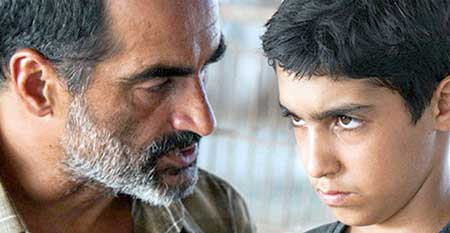Film (2015)
National Center for Jewish Film
West Newton Cinema, Newton, MA
Written and directed by Yuval Delshad
Music composed by Eyal Saeed Mani
With Navid Negahban (Itzhak), Asher Avrahami (Moti), David Diaan (Dariush), Rafael Eliasi (Baba), Viss Elliot Safavi (Sarah), David Ben-Avraham (Moti’s teacher)

Asher Avrahami as Moti
in “Baba Joon”
Moti (Asher Avrahami), a sweet young boy of ten or eleven, if the single child of Itzhak (Navid Nagabhan) and Sarah (Viss Elliot Safavi), an Israeli couple originally from Iran who live on a moshav (collective farm) in the Negev desert, and earn their living raising turkeys. Though showing talents as an inventor, Itzhak has gone into his father’s business as a turkey farmer, and, in turn, has expectations for his only child, Moti, to join him. The expectations are intense, and observations of Itzhak’s relationship with his own aged father, Baba (Rafael Eliasi), and that between his brother Dariush (David Diaan) and his father, shed light on the family dynamics. Caught in the middle are Moti, of course, and Sarah, who tries to offer sage advice to both father and son along the way.
This affecting drama is simple but effective. We watch, at every turn as Itzhak tries to nurture his son, but also to cajole him into participating fully in his own farming enterprise. Moti is, to say the least, lukewarm. He’d much rather invent, and weld together the cool self-designed motorized cart he’s been working on. But Itzhak is relentless and does everything to force Moti into his own business. The interplay of father, son, grandfather, uncle and mother is complex and reveals, in a series of twists and plot developments, the intensity of the paternal and filial relationships that drive their history.
There is a surprise at the beginning, when Itzhak goes to Moti’s school to interact with a teacher with whom Moti has had a conflict. It’s a jarring and effective moment and matched at the end of the film with an equally surprising moment. These two moments, in a way, frame the whole relt of the film which is an elongated meditation on paternal manipulation. It’s effectively done, but there is a deliberate and difficult quality to the depiction as it unfolds in scene after scene. But that deliberate quality has its payoff in a final resolution and somehow it all seems worth it at that point.
Of course, one is left to wonder what actually enables Moti in his development; it’s miraculous that he emerges in the way that he does at those two focal dramatic points. Given the intractable position in which he is held through generations of domineering paternal influence, the breakaway is dramatic. One expects that possibility of release is a result of this family having taken up life in Israel. Nonetheless, from the film’s narrative, it’s not always clear whether the film primarily intends an observation of traditional Iranian familial relations and expectations within the contemporary Israeli scene, a reflection on traditional Sephardic familial relationships, or a consideration of paternalistic expectation in a more general way. Whatever the dominant inspiration, this relatively simple tale is evocatively conveyed.
– BADMan
Leave a Reply